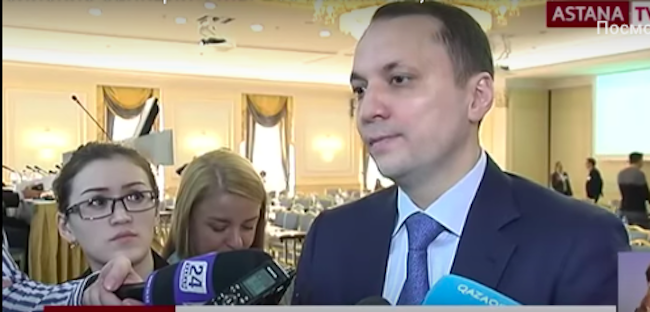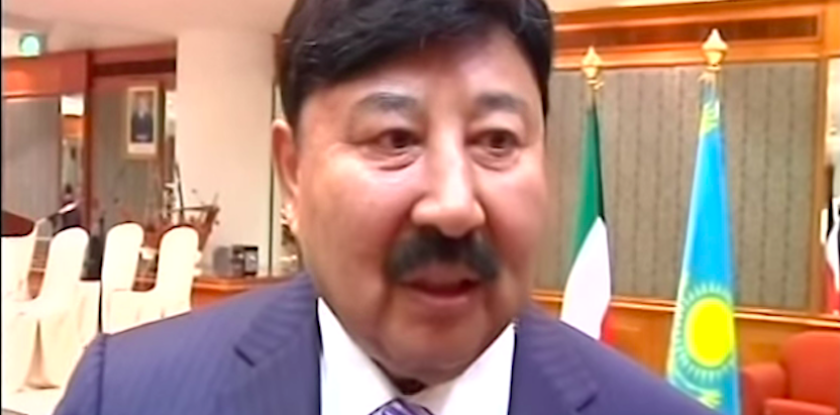The foreign investors that take the risk of coming to Kazakhstan invariably face the corruption problem. We have already proven this fact numerous times via specific references including the high-profile case of Vice Minister of Industry and Infrastructural Development Timur Toktabayev and Dutch company Babylon Holdings B.V. that was incautious enough to purchase 90% of MTS-Ertis LLP.
To remind the reader of the particulars of this case, let us quote several passages from our publications Оn Those Able to “Bustle About” and Who Holds the Permits Black Market.
“As a result, Kazakhstan has formed the bureaucratic apparatus that is cardinally different from that of the Soviet times and the first years of the Kazakh independence. And the difference is not in favor of the former. We at kz.expert believe the apparatus now is less professional, more dependent on the higher authorities and, therefore, defenseless against their despotism. There exist many reasons why this happened the way it did, but the main one lies in the fact that, in the context of the authoritarian political system and the super-presidential vertical, Akorda and Nursultan Nazarbayev personally need the obedient executants of their will and not the people who have their own convictions and are capable of standing up for them.
Thus, in terms of its professional qualifications, the corpus of the officials, the governmental and the quasi-governmental sectors is even worse than the bulk of the ordinary Kazakh population due to the negative selection process and the elevated risks that accompany working for the state. This is especially true in regard to the recent years when Akorda has simultaneously launched several campaigns – on formalizing the management process (among other things, via the introduction of the modern information technologies), fighting corruption, introducing the principles of meritocracy and so on and so forth.
Under these circumstances, those who choose the state service or the governmental/quasi-governmental sector do not have much choice. They either have to play by the rules (determined by the state, their bosses or the environment in which the consumerist moods are now prevailing) or to move to the non-governmental sector, or to “bustle about” (in other words, make money via dishonest means). And since all the current official and unofficial rules do not correspond with each other and even contradict each other, “busting about” seems to be the preferred option for the smarter folks.
With that, there is the direct correlation between the rank of a given official and his ability to “bustle about”. The higher the rank and the influence of his “native” agency, the wider the circle of ties and connections, the better his prospects are.
This is one of the main (but not the only) reasons why corruption, abuse of authority, stealing, protectionism and nepotism thrive so strongly in Kazakhstan. And why Akorda is unable to eradicate them”.
“As we have underscored several times earlier, the foreign investors wishing to work legitimately without giving bribes to the Kazakh officials will find it difficult (sometimes, even impossible) to operate in the country.
With that, the main problem of Kazakhstan lies not in the individual officials wanting to receive a “bakhshish” but in the full-on readiness on the part of the officialdom to make money on anything they can make it on.
This is the result of the overlapping of many factors, starting from the historic ones when the barymta (stealing the livestock from an unfriendly (non-related) peoples) was widespread in the Kazakh steppes to the following of the example of the Leader of the Nation Nursultan Nazarbayev, his allies and relatives who have, quite successfully, converted the usurped state power in the fortunes constituting billions.
With that, the campaign against corruption, abuse of authority, embezzling the funds from the budget and the quasi-governmental structures that has been underway in the resent years is, in fact, nothing but sham because:
- only those who have been caught red-handed by the law-enforcement agencies end up behind bares (or get off by paying a fee) which constitutes a non-significant share of the people breaking the law;
- for the law-enforcers to operate effectively, they need: a) an order from the above, b) the pressure from the parties damaged by the conduct of the official; c) the lobbying of the issue by the competitors interested in the dismissal of the guilty party to be able to replace them with their own stooge or to simply do damage to the opponents”.
In view of this, we personally do not find it surprising that, despite the high-profile scandal with the double sale of 90% stake in MTS-Ertis LLP (the company that had obtained the contract for the polymetallic ore exploration at the Vavilonskoye ore field in the East-Kazakhstan region) first to the Dutch Babylon Holdings B.V. and then to the Kazakh SK Atrium LLP, Vice Minister Timur Toktabayev has kept his post.

It looks as if Toktabayev serves as a key element in one of the corruption networks that are operating inside the state apparatus. And, by our estimates, Kazakhstan has got thousands of them.
Apart from that, officials or entrepreneurs may simultaneously be a part of a dozen of the shadowy groups and choose whether to participate in a given “operation” or not. (This, by the way, is what separates the Kazakh organized criminal groups from say the Italian mafia where discipline and loyalty are demanded from all the members of the group and not only from the godfather’s closest associates).
One way or another, each of these corruption networks is mandatorily “shielded” by an influential figure from among the power circle. This figure does not manage the network’s everyday activities. Moreover, oftentimes they are not even aware of who the network’s members are and what they do exactly. Their task is to lobby the requests that come from the below, to negotiate, to advocate and to fix problems. In exchange for either payments or services performed by their henchmen.
In regard to Toktabayev, the part of such “influential figure” is performed by Temirkhan Dosmukhanbetov, an old associate of the First President, former governor of Astana and former head of the Department of Presidential Affairs.

The contacts with him are maintained through his son Chingiz. Recall that he and Vice Minister of Industry and Infrastructural Development Timur Toktabayev co-own KEMP-VOSTOK LLP in which, apart from his own funds, the latter has “invested” 11 permits for exploration and development.
On April 23, 2019, the Specialized Interdistrict Economic Court of the East-Kazakhstan region (located in Ust-Kamonogorsk) reviewed the claim filed by Babylon Holdings B.V. on rendering the sale-purchasing agreement between Metal Trade Company LLP and SK Atrium LLP on the sale of MTS-Ertis’ share unlawful and subject to denunciation. The court sustained the claim. On the same day, the appellate agency too found the re-registration of MTS-Ertis’ share in the Semey Department of Justice unlawful. However, these verdicts do not at all mean that the foreign investor has already won and may begin implementing their investment project.
According to the information provided by our insiders, Vice Minister of Industry and Infrastructural Development Timur Toktabayev has commissioned the legal services of his agency to prove that the approval for the sale-purchasing deal between Metal Trade Company LLP and SK Atrium LLP was issued legally while his shadowy business-partners are already trying to find an access to the top-officials of the East-Kazakhstan District Court. So, it looks like the foreign investor will have to invest their money again and again albeit not in the business-project but in advocating their interests in court.
Then again, even if Babylon Holdings B.V. will be able to defend its interests, we believe the company’s chances for conducting successful business in Kazakhstan are minimal. For it is not only the defeated party, the Ministry of Industry and Infrastructural Development, that will be fighting against it but many other officials as well. One may even say it will be the country’s entire state apparatus.
Why? Because no official wants the people who wash dirty laundry in public and are not prepared to give out as much money in shadowy rewards as the officials would like them to.
Moreover, local entrepreneurs may also take a stand against such uncompliant investors. Kazakhstan does not favor those who break the rules and attract too much attention to themselves.




